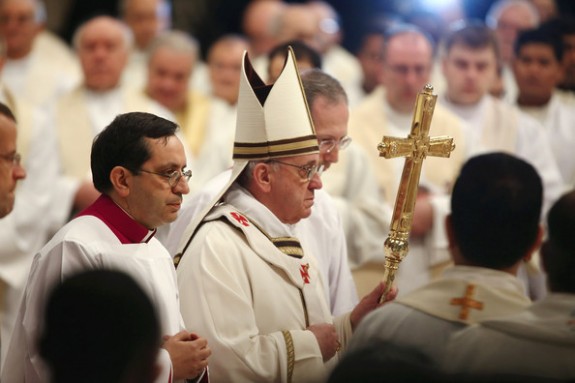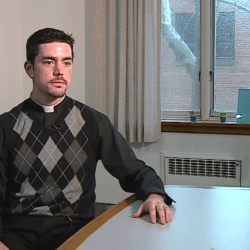I wondered earlier this week if the new pontiff might have a profound impact on vocations.
Fr. Roger Landry in the National Catholic Register is sensing an impact, already, on the priesthood:
In his first couple of weeks as Pope, as well as his 14 years in Buenos Aires, Francis has been charting out the trajectory of priestly reshaping. We can focus on seven aspects of this needed renewal.
The first is with regard to priestly simplicity.
Diocesan priests do not take a vow of poverty, but commit themselves to a simple lifestyle. In many places, this principle is given lip service, as members of the clergy drive fancy cars, frequent the finest restaurants and live in exquisite digs. Cardinal Bergoglio’s example of living in a small apartment rather than an episcopal palace, taking public transportation rather than a car with a driver and cooking for himself cannot help but lead priests to a sincere examination about the sincerity of their own spiritual poverty.
Second, throughout his time as archbishop, the future Pope spoke out forcefully against priests’ living a “double-life.” When he was asked in a 2010 book-length interview, El Jesuita, about the common saying in Argentina, “I believe in God, but I don’t believe in priests,” he replied, “Many of us priests do not deserve to have them believe in us.”
He wants to change that, by calling, helping and requiring priests to live with genuine priestly integrity.
In Buenos Aires, if the priests found themselves in difficult circumstances, he would help them address their situation, even if it meant their deciding to leave the priesthood. What he absolutely wouldn’t tolerate, however, was priests’ living incoherent lives, because he knew how much that harms and scandalizes God’s people.
This leads to the third aspect of his reform of the priesthood: bringing about priestly accountability.
Paying his pre-conclave bill at the priests’ residence personally immediately after his election was not just a nice gesture indicating a total absence of a sense of privilege, but it was a real sign that not even popes should consider themselves exempt from the demands of ordinary justice.
Fourth, he is likewise sketching out an authentic revision of the use of clerical power.
As he emphasized in the homily of his inaugural Mass, a priest’s authority must be linked to service, to the tender affection and protection given especially to the poorest, weakest, the least important and most easily forgotten. Like the Good Shepherd, the priest must seek to be the servant, not the lord, of the rest. This is the exact opposite of the haughty clericalism that in many places has hurt many and wounded the Church.
Fifth, he is calling priests to be men of profound mercy.
Whenever priests ask him for advice, he noted in El Jesuita, his answer is always, “Be merciful.” His motto Miserando Atque Eligendo (“Lowly But Chosen”) highlights that his own vocation was born in an experience of God’s mercy, when as 17-year old boy he went to confession on the feast of the St. Matthew, the great convert. Pope Francis’ reminder in his first Angelus address that God never tires of forgiving us is a clear call to priests never to tire in faithfully dispensing that mercy, sacramentally and extra-sacramentally.












